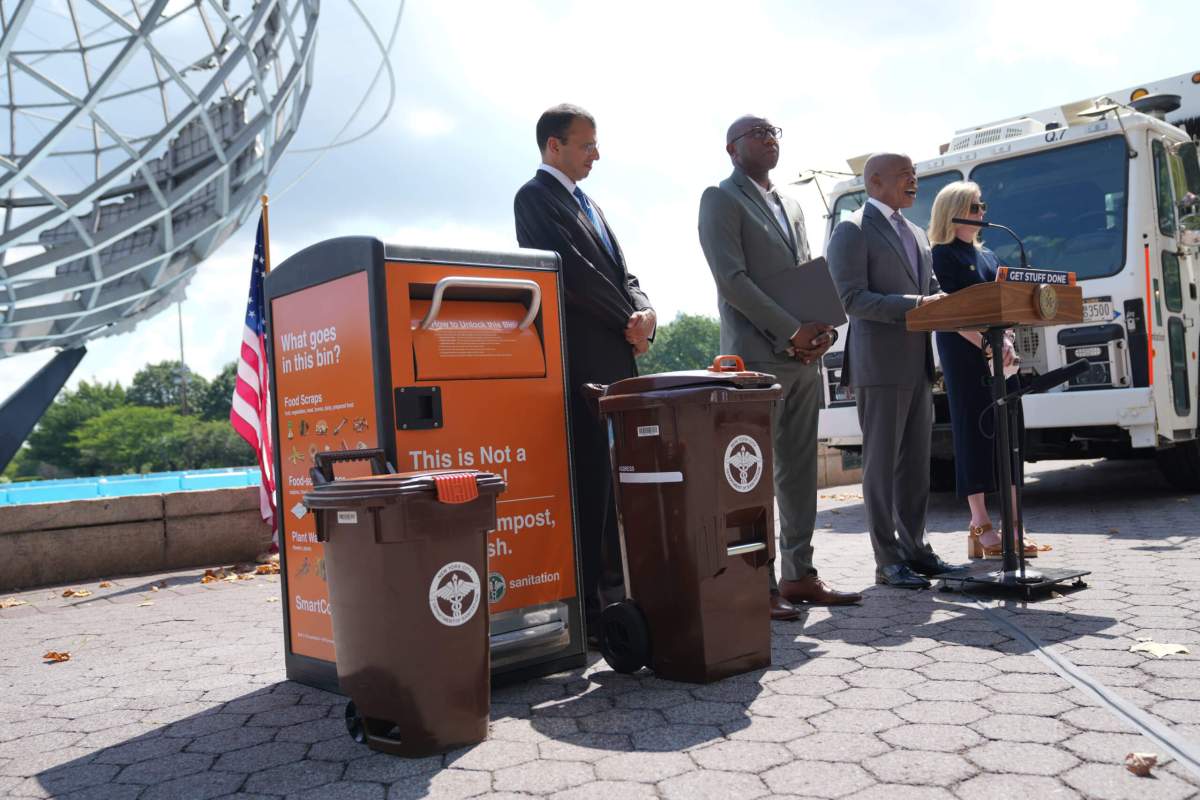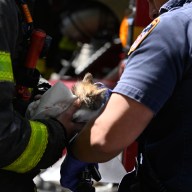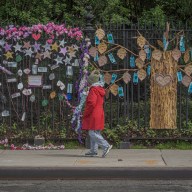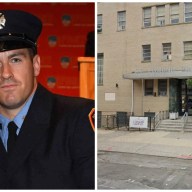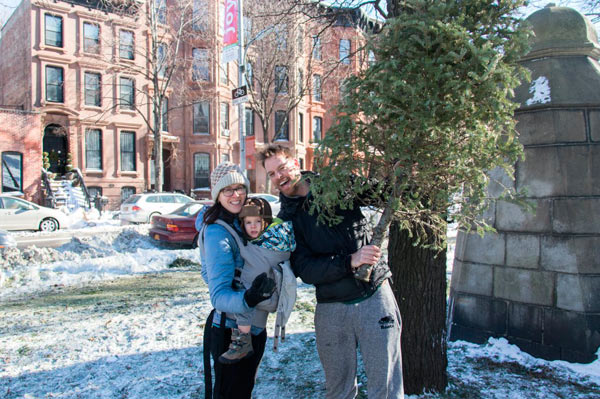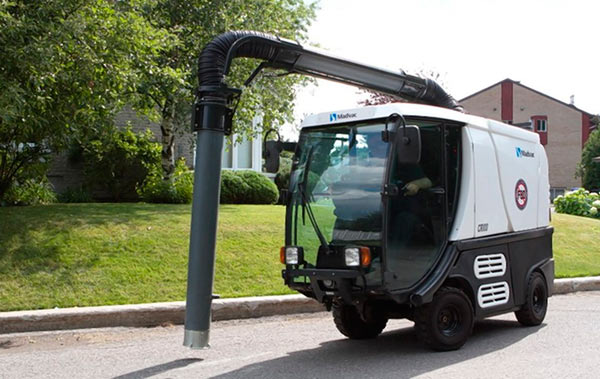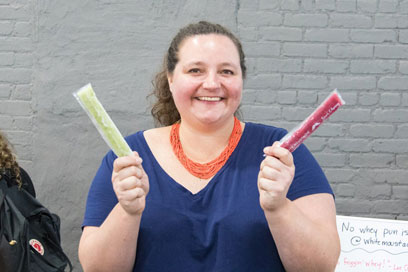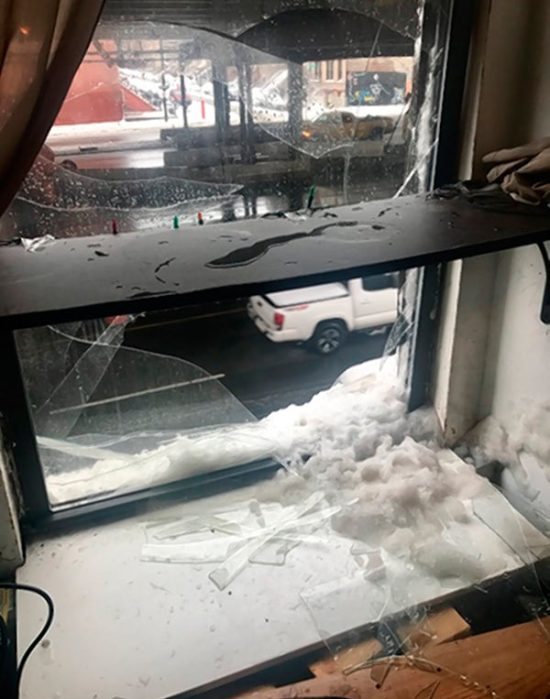North Brooklyn Councilmember Lincoln Restler has spent his first year in office working on making his district more climate-friendly — and on Wednesday, he introduced a bill that aims to make composting publicly accessible all across the city.
The bill, Int. 863, would require the city’s Department of Sanitation to install public compost containers in every community board in New York City — just like public trash and recycling bins. Restler imagines five bins in each district, placed along busy corridors and in areas like public parks, where people are more likely to be looking for somewhere to toss their leftover food or other compostable items.
‘We should be composting absolutely everything that’s compostable’
“When you’re walking about, when you’re finishing up your lunch after sitting in the park, you’ve got a place to recycle your drink and throw away your waste, and you should have a place to compost that extra piece of sandwich you didn’t get to,” Restler said. “We should be composting absolutely everything that’s compostable.”
Compostable materials — including food waste, used paper napkins and towels, and some paper food containers — make up one-third of New York City’s waste each year. While those items are technically biodegradable, they need oxygen, insects, and other organisms to break down properly — when sent to crowded landfills, they just end up producing more greenhouse gases.
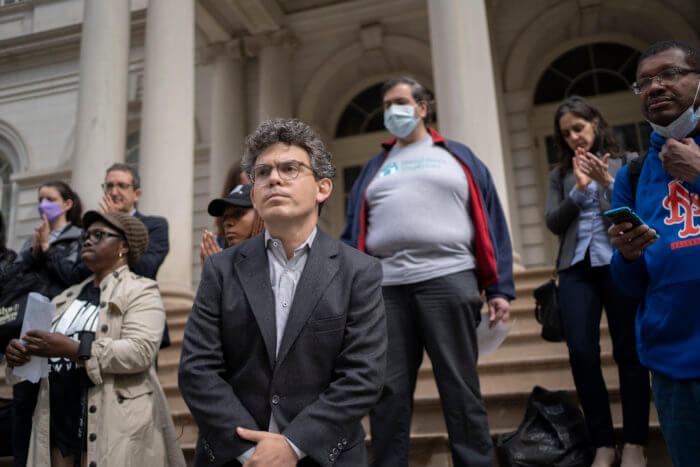
“If we’re going to get rats off our streets, if we’re going to drive down our carbon emissions, we have to be making composting not just as easy as possible, but a part of our daily routine,” Restler said.
Earlier this year, Restler released a five-point Climate Action Roadmap for District 33 — including reducing waste by expanding curbside and community compost programs. The idea for public compost bins was inspired by a pilot program run by the Downtown Alliance, a lower Manhattan Business Improvement District, in partnership with the city.
As part of the city’s “Smart Bin” pilot program, the Alliance has installed 10 orange compost bins around lower Manhattan where locals can drop their organics while they’re out and about. The bins are regularly emptied, and finished compost is used in city parks and other greenspaces — the city also gives out compost to community gardens or other organizations, who may use it themselves or distribute it to local residents to use in their yards and gardens.
The sanitation department has also installed Smart Bins in Astoria as part of the pilot program — which has been “hugely successful,” according to a department representative, with each bin totally filling up each and every day. In the next few weeks, 250 more Smart Bins will be installed throughout the city.
If his bill passes, Restler pictures making a few changes to the program — the current Smart Bins require an app to unlock, for example, and he wants to make accessing the bins as easy as possible.
He does see other local BIDs as potential partners in a citywide composting program, though. The text of the proposed legislation says the sanitation department would be required to empty the bins at least once a week, but the city does not have regular citywide compost pickup.
Program would compliment city’s curbside composting
Based on the success of the city’s borough-wide curbside composting program in Queens, Restler said he’s confident the public sites could be integrated into existing DSNY routes.
“As we achieve citywide curbside composting in the years ahead, pickup of these community compost locations could also be incorporated,” he said. “One separate thing to note is that business improvement districts have their own, private carting partners that they work with for trash pickup.”
Since the bill would place compost bins in busy public areas – like commercial corridors likely to be serviced by BIDs — it may be possible to bring them on as partners and leverage those existing waste pickup services rather than relying fully on the sanitation department.
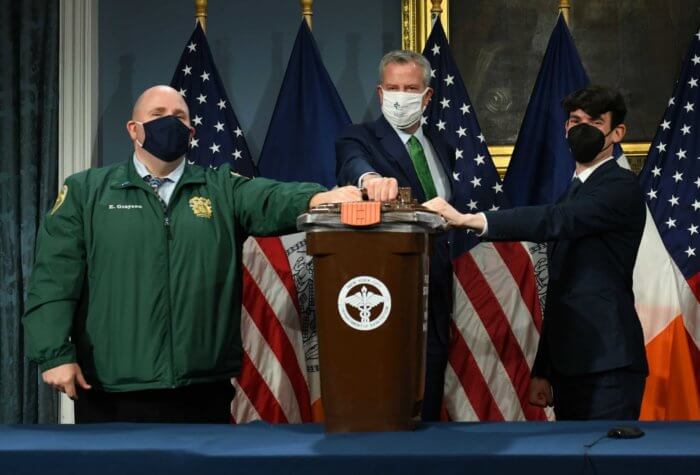
The councilmember also pictures working with community organizations — not just BIDs — to decide where the bins would make most sense.
Then-mayor Bill de Blasio scrapped the city’s curbside composting program in May 2020 to keep up with pandemic budget cuts. It was re-launched last year on an opt-in basis in a small number of neighborhoods.
Last fall, the city launched its borough-wide curbside compost program in Queens — which has, so far, been a smashing success, with more than 1 million pounds of waste being collected in the first two weeks. Restler said he’s a “strong proponent” of citywide mandatory curbside composting.
“It was 15 years ago that we passed legislation to require that there be recycling bins out and about for community members to recycle, the next phase is composting,” Restler said. “It’s, to me, obvious and overdue and a simple enough policy for us to be able to make it happen.”
Update 12/23/22, 12:38pm: This story has been updated with comment from the Department of Sanitation.


